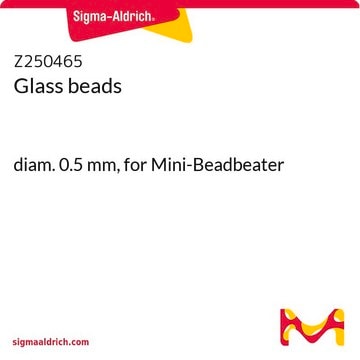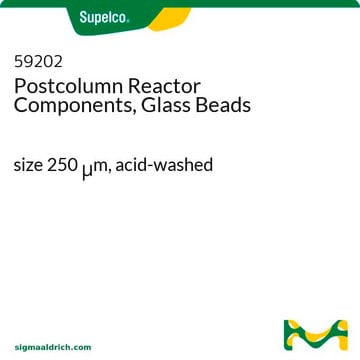G1145
Glass beads, acid-washed
150-212 μm (70-100 U.S. sieve)
Synonym(s):
Glass Beads
Sign Into View Organizational & Contract Pricing
All Photos(2)
About This Item
UNSPSC Code:
41102422
NACRES:
NB.22
Recommended Products
particle size
150-212 μm (70-100 U.S. sieve)
Application
Acid-washed glass beads have been used:
- in the lysis of yeast colonies to produce a yeast two-hybrid screen
- in the extraction of DNA from Penicillium roqueforti mycelial samples
- in disruption of Streptococcus thermophilus and Lactobacillus delbrueckii subsp. bulgaricus strains for determining the enzyme activity
Storage Class Code
11 - Combustible Solids
WGK
nwg
Flash Point(F)
Not applicable
Flash Point(C)
Not applicable
Personal Protective Equipment
dust mask type N95 (US), Eyeshields, Gloves
Certificates of Analysis (COA)
Search for Certificates of Analysis (COA) by entering the products Lot/Batch Number. Lot and Batch Numbers can be found on a product’s label following the words ‘Lot’ or ‘Batch’.
Already Own This Product?
Find documentation for the products that you have recently purchased in the Document Library.
Customers Also Viewed
Kim I Sørensen et al.
Applied and environmental microbiology, 82(12), 3683-3692 (2016-04-24)
Streptococcus thermophilus and Lactobacillus delbrueckii subsp. bulgaricus are used in the fermentation of milk to produce yoghurt. These species normally metabolize only the glucose moiety of lactose, secreting galactose and producing lactic acid as the main metabolic end product. We
Nahid Kondori et al.
Frontiers in cellular and infection microbiology, 11, 634215-634215 (2021-08-13)
Bloodstream infections (BSIs), the presence of microorganisms in blood, are potentially serious conditions that can quickly develop into sepsis and life-threatening situations. When assessing proper treatment, rapid diagnosis is the key; besides clinical judgement performed by attending physicians, supporting microbiological
Danny Incarnato et al.
Nucleic acids research, 45(16), 9716-9725 (2017-09-22)
Defining the in vivo folding pathway of cellular RNAs is essential to understand how they reach their final native conformation. We here introduce a novel method, named Structural Probing of Elongating Transcripts (SPET-seq), that permits single-base resolution analysis of transcription
Timo Birkenstock et al.
The Journal of biological chemistry, 287(4), 2887-2895 (2011-12-07)
The desperate need for new therapeutics against notoriously antibiotic-resistant bacteria has led to a quest for novel antibacterial target structures and compounds. Moreover, defining targets and modes of action of new antimicrobial compounds remains a major challenge with standard technologies.
Haojie Jin et al.
Frontiers in microbiology, 9, 1662-1662 (2018-08-09)
To advance synthetic biology in the photosynthetic cyanobacterium Synechocystis sp. PCC6803 (Syn6803), we constructed a shuttle vector with some versatile features. This shuttle vector, pSCB-YFP, consists of a putative replicon identified on the plasmid pCC5.2, the origin of replication of
Our team of scientists has experience in all areas of research including Life Science, Material Science, Chemical Synthesis, Chromatography, Analytical and many others.
Contact Technical Service












